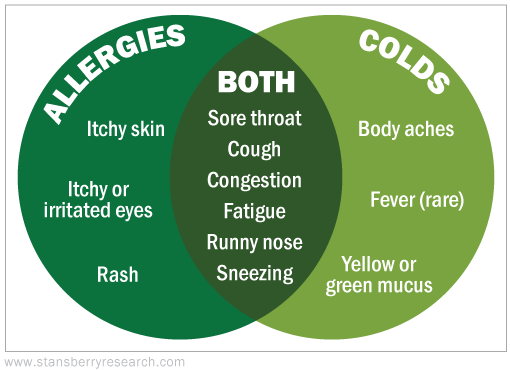Each year, 50 million Americans suffer seasonal allergies...
And nearly all of us have to fight off a few colds a year.
You can avoid or even shorten your suffering. But first, there's one question you need to answer...
"Is your sneeze from allergies or a cold?"
Early September through March or April is prime cold season, likely because we spend more time indoors with each other, where the virus can spread easily.
And this time of year is also prime time for allergies...
According to the scientific journal Proceedings of the National Academy of Sciences of the United States of America, fall allergy season is lasting longer than ever. Fifteen years ago, allergy seasons lasted an average of about 60 to 75 days. Now they last almost 100 days. That's a lot of sneezing.
A good way to figure out if what you're feeling is a cold or allergies is to check out your symptoms on the diagram below:
Keep in mind, this isn't perfect. For instance, although a sore throat isn't typical for allergies, enough post-nasal drip can lead to soreness (as well as nausea). Similarly, allergy problems and common colds can lead to a sinus infection.
An important thing to keep in mind – duration. Typically, allergies will have the same symptoms and last a lot longer (even up to that 100-day mark!). Colds typically resolve in about a week, with symptoms changing as the virus runs its course.
Here's what to do for each:
Allergies
Fall allergy triggers include different weed pollens. Damp leaves that start to get moldy also trigger mold allergies. (That's why my researcher makes her husband rake their yard each fall.)
When your body encounters these triggers, your immune system treats pollen or mold as an invader... producing antibodies to defend your body... and causing stuffiness, sneezing, itchy eyes, and coughing.
What's more, as we age, our immune systems weaken. Typically, this may reduce allergic reactions, so you may feel some relief. However, according to Dr. Richard Lockey at the University of South Florida, since more folks are healthier later in life, he's seen plenty of 80-year-olds still "having symptoms or developing new allergies."
Practice good allergy "hygiene" to stay free of sniffles this time of year. For starters, use a HEPA air filter in your bedroom. I keep one in my bedroom and clean the filter once a week. It filters out mold, pollen, and other allergy triggers.
You can find my other tips for allergy hygiene right here.
Colds
Drops in temperature this time of year are perfect for viruses. About 200 different viruses cause colds, but the majority of us get sick from just one... rhinovirus, best known as the common cold.
According to a study published in Proceedings of the National Academy of Sciences of the United States of America, the chilly air weakens your body's defenses.
The lower the temperature, the weaker our bodies' response to viruses. That means we're less able to resist rhinovirus.
As I've written before, the only two supplements I recommend are zinc and vitamin C when you feel a cold starting. Zinc strengthens the body's "T-cells," which fight off invading bacteria and viruses in the body. Vitamin C reduces the symptoms of the common cold within hours. It's an antioxidant. That means it helps combat inflammation and regulates blood flow. You can read more about both of these right here.
In addition, plenty of exercise, regular hand washing, and a ban on sharing utensils, drinks, and similar food items will cut down on germs this season.
I encourage you to keep these steps in mind this season. Boosting your immune system now will cut down on symptoms and complications should you get sick or suffer allergies.
[optin_form id="73"]
What We're Reading...
- An interesting look at vitamin C also helping allergies.
- A final breakdown: Colds versus allergies.
- Consumer Reports busts a few allergy-related myths.
- Something different: Three Americans win the Nobel Prize for their work on our internal clock.
Here's to our health, wealth, and a great retirement,
Dr. David Eifrig and the Retirement Millionaire Daily Research Team
October 3, 2017

